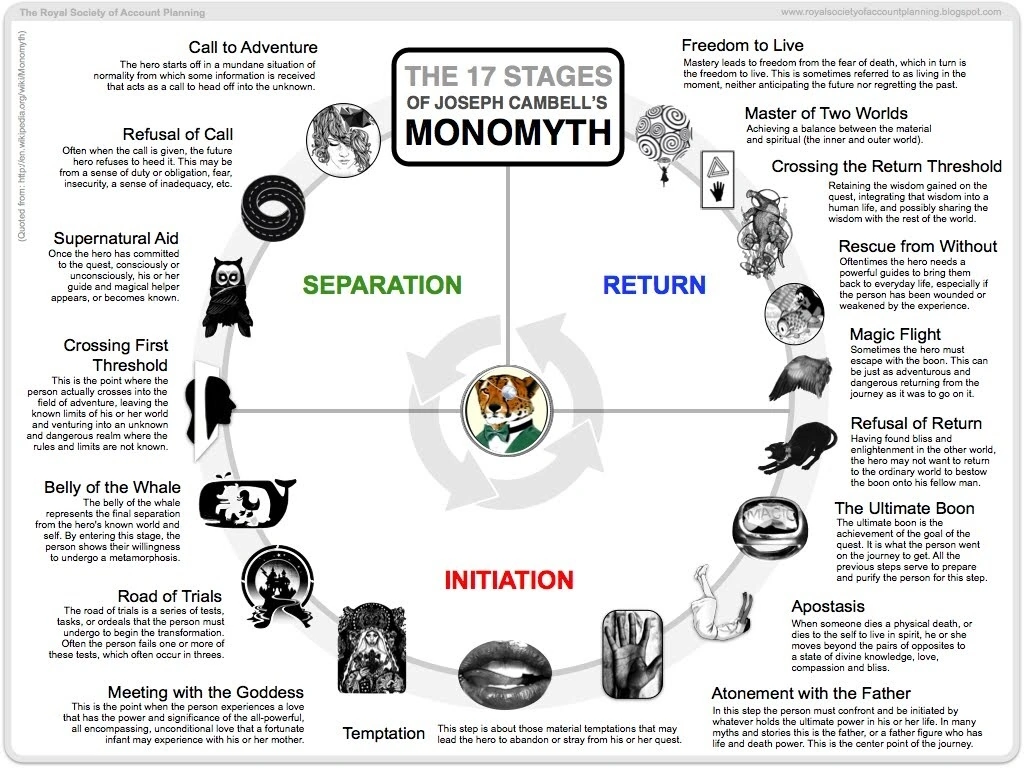Hero's Journey in Fun Home (Dr. E cameo?!?!)
During one of our final discussions of Fun Home, we were prompted to think about the meaning of the title of the final chapter of the book, "The Antihero's Journey". Habits from Dr. E's Hero's Journey class kicked in and I started to view Alison's narrative in comparison to Joseph Campbell's hero's journey template. Joseph Campbell's hero's journey or monomyth is a template with 17 stages for narratives, which ultimately depicts a major transformation in a character. Some heroes' journeys have stages that are out of order, skip stages, or repeat stages. But at what point is it no longer a hero's journey?
I won't go through every stage of the template with Alison's narrative but I think it is clear that her narrative aligns with the template well. Alison's separation phase occurs when she leaves for college and begins researching lesbian literature and understanding her own sexuality. Her initiation phase occurs throughout college while she learns more about her sexuality, and her parents, and deals with the struggles that followed. Finally, her return phase occurs when she is able to return to Beech Creek while maintaining her identity and values from her transformation.
It is made clear multiple times throughout the novel that Bruce stayed in Beech Creek his whole life. Despite leaving Beech Creek when he was in college and the military he ultimately returns to Beech Creek, just miles from where he was born. Although I don't think a geographical change is necessary for a hero's journey to occur, Alison's change in location is accompanied by her transformation. For Bruce, the environment of Beech Creek may have not allowed for a similar transformation. Some aspects of Bruce's narrative seem to align with the Hero's Jurney, we know that Bruce had relationships with other men and was aware of his sexuality. This could be representative of having a separation and initiation phase. However, this part of his life is hidden from most people and has to be carried out in secret and illicit ways.
The penultimate stage in the hero's journey is called the "master of two worlds" and is described as "For a human hero, it may mean achieving a balance between the material and the spiritual. The person has become comfortable and competent in both the inner and outer worlds." For both Alison and Bruce one "world" is their life within Beech Creek and the other is their life outside of Beech Creek where they can be open about their sexuality. It appears that Alison is able to be a master of both worlds and can be open about her sexuality while being in Beech Creek. Bruce on the other hand never was able to be a master of both worlds. Although some narratives are still considered to follow the hero's journey even if they are missing a step, I think that the "master of two worlds" stage is a necessary stage for a hero's journey. Without this stage, there is no clear transformation in the character which is one of the defining aspects of a hero's journey.

I really like this interpretation of Alison's "return home" after her heroic announcement of her sexual identity, and there is a very strong sense of her now as "master of both worlds." I think of the scene with the two of them on that awkward car ride, where she feels like the parent and he's the shamed kid mumbling and trying to express himself. She has HAD a journey, and he's trying to grapple with the realization that he never did--I always see a good deal of envy creeping out of Bruce's facade in this scene, especially in his vague acknowledgments about how "things are different now" and suggestions that he might have lived differently if he'd been born later. But he never speaks of any of this stuff with specificity or confidence, and he is generally mumbling and vague while Alison's triumph comes in the explicit, straightforward declaration "I am a lesbian." Bruce's version of this "I am" statement would have a lot of long sentences and qualifying clauses, as he is never able to achieve this "boon" of confident embrace of identity. He doesn't really know what he is, in this final scene between them where his daughter seems to know exactly who she is.
ReplyDelete